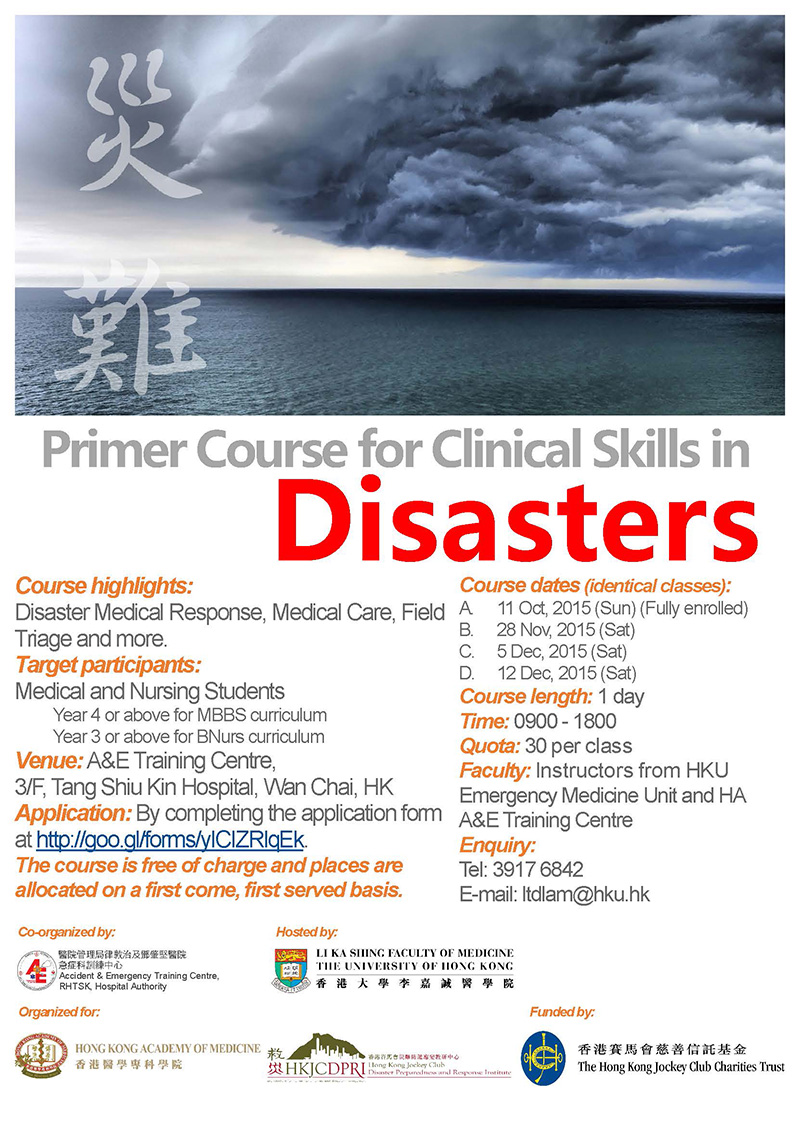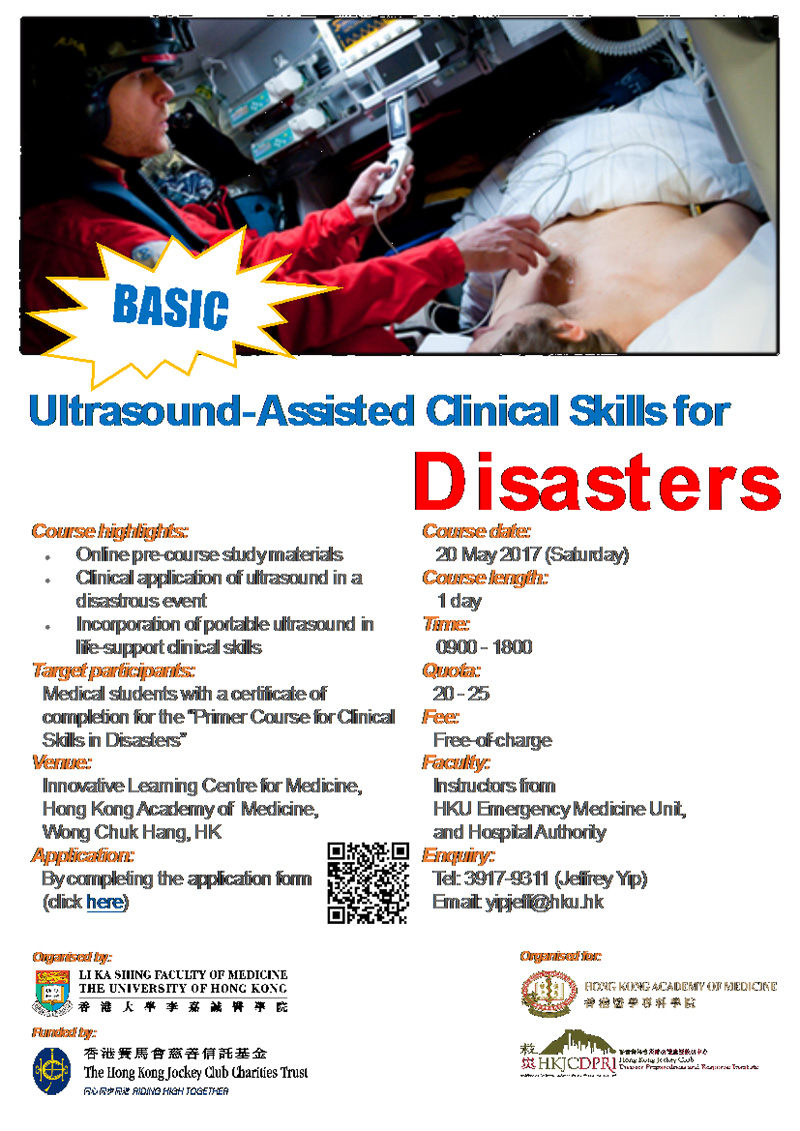Previous Courses
Primer Course for Clinical Skills in Disasters
| Features: | "The Primer Course for Clinical Skills in Disaster" is a one-day course delivered by a team of physicians, health-care professionals and experts from the Emergency Medicine Unit and the Accident & Emergency Training Centre of Hospital Authority. It is funded by The Hong Kong Jockey Club Charities Trust. Since its first launch in August 2015, this course has already trained hundreds of medical and nursing students from both HKU and CUHK. |

|
| Contents: |
|
Ultrasound-Assisted Clinical Skills in Disasters
| Features: | Disasters often involve large number of victims with various degree of trauma and injuries. Rapid assessment and treatment at the field can help maximize the chance of survival of victims while optimizing the utilization of the limited resources in the field. Point-of-care ultrasound (POCUS) is emerging in different clinical settings as a useful diagnostic tool and guidance for life-saving skills and procedures. With the advance in technology and portability of modern ultrasound devices, field application of POCUS is proven to be practical and useful in disasters. This Course focuses on the integration of POCUS with life-saving clinical skills in disasters. Teaching will be conducted with a combination of online study modules, didactic lectures, hands-on practice sessions and simulation training. |

|
| Contents: |
|
Ultrasound-Assisted Triage in Disasters
| Features: | In a disastrous event that results in a large number of casualties, how to efficiently and effectively allocate medical resources in a timely manner is critical. Triage assisted by point of care ultrasound is a proven skill that can improve allocation of medical resources and maximize the benefits to the injured. This course is specifically designed for paramedics with emphasis on USG application in the prehospital setting. |
| Contents: |
|
Disaster Medicine 101
Organized by Emergency Medicine Unit in collaboration with the Fire and Ambulance Services Academy of the Fire Services Department and Centre for Sports and Exercise of HKU.
There are 3 themes in this course. Students are first given an overview of disasters with emphasis on the Hong Kong scenario. It also includes an introduction to the principles of disaster cycle and management. In the second part, the skills and knowledge of surviving in an austere environment are taught together with instructors from IHP. The third theme deals with scene management in terms of search, rescue and decontamination in HAZMAT incidents. This part of training is conducted at the Fire and Ambulance Services Academy and is taught by the professional fire and ambulance officers.
Common Core Course
Responding to Natural Disasters (CCST9053 Scientific and Technological Literacy)

| Features: | This course focuses on a critical analysis of how science and technology are woven into our responses to natural disasters, especially (but not only) the meteorological ones. The two key perspectives in the course are about the interplay between natural disasters, science and technology, and the roles of science and technology in our responses to natural disasters. To illustrate these two perspectives, lectures and tutorials are arranged in such a way that students are led through the 3 phases of disaster response: preparation for a disaster, response during the acute event and post-disaster management. A special feature in this course is the inclusion of a community-based disaster risk reduction project. It adopts a participatory approach with experiential learning in order to enhance students’ problem solving and analytic ability. |
| Contents: |
|
Health is Global: An International Relations Perspective (CCGL9060 Global Issues)
| Features: |
Timetable for Lectures https://commoncore.hku.hk/files/CommonCore_Timetables_Sem1-2.pdfWhile this course is open to students from all Faculties as a regular Common Core course, it is also tailored to be flexible in class participation for MBBS students in their Enrichment Year, who, after Face-to-Face interaction at the beginning of the course will participate through online learning at their study site in Mainland China / overseas. |
| Contents: |
Course Description In this course, we will address how global health issues play out in an international context. Interaction between national, multinational, profit-seeking and philanthropic entities will be the subject of our exploration. We will first begin with the origin of global health diplomacy and its development across periods of significant health incidents. Special attention will be given at international framework such as World Health Organisation; we will look at its instruments and limits along with the nature of diplomatic constraints in this section. We will then move on to topics on globalisation and the emergence of multinational enterprises that affect people’s health and see how their interest shape the global health conditions. The creation of large scale enterprises and NGOs, as well as the birth of mega-philanthropists, open up the conversation from the international to organizations at different levels. Lastly we will apply knowledge we have learnt to understand the development of global health governance and the diplomatic relationships, in the broad sense of “diplomacy,” of different parties. Role-play activities will be adopted to make the learning process both interesting and realistic. Course Learning Outcomes On completing the course, students will be able to:
|
Shaping our Health: Policy Formation and ‘Glocal’ Experience (CCST9071 Scientific and Technological Literacy)
| Features: |
Timetable for Lectures https://commoncore.hku.hk/files/CommonCore_Timetables_Sem1-2.pdfWhile this course is open to students from all Faculties as a regular Common Core course, it is also tailored to be flexible in class participation for MBBS students in their Enrichment Year, who, after Face-to-Face interaction at the beginning of the course will participate through online learning at their study site in Mainland China / overseas. |
| Contents: |
Course Description In this course, we will analyze the formation of health policy, which aims at achieving specific health care goals. In this process, knowledge including science, engineering, architecture, law, social science, education, humanities and business management all have a role in shaping the vision for the future and we will draw every useful part of them in this course to provide you a comprehensive understanding of how our living condition and health are being shaped. We hope that through analyzing the formation of health policy, you will develop a broader perspective and a critical understanding of the complex connections between healthcare policies in their everyday lives. Our course will cover healthcare policies in East and Southeast Asian, Latin American, US, UK and local contexts. You will be empowered to navigate the similarities and differences between cultures and discover alternative systems of thinking that areadmin related to different living environments as well as technological and geopolitical situations. Prominent politicians across the spectrum will be invited to share with us their experience, insight and stories on policy making and beyond. Course Learning Outcomes On completing the course, students will be able to:
|
Public Health Leadership (2019-2020)
The goal of the programme is to provide medical students a global vision and experience on how doctors may help shape the health of the population beyond the direct clinical encounters. Students will be provided face-to-face and online training on leadership, public health emergencies and research methodologies (quantitative, qualitative and mixed-methods), based on what they have learnt in Year 1 and 2. The design of the course reflects the following educational principles:
Experiential Learning
The programme offers students developing skills through different community settings – healthcare facilities, government offices, corporates and households.
Leadership-based
Students are required to take up projects to practise leadership and teamwork. Students play an active role in the design and operation of the projects. With support from faculty teacher and local tutor, students would explore the possibilities and evaluate for the feasibility of individual research project. Students are encouraged to be active in managing their own learning and to question both what and how they learn through tutorials and meetings. These teaching sessions foster the development of skills for interpersonal communication and teamwork, and help train students to become lifelong learners.
Integrated Curriculum
Students will develop global health knowledge, together with leadership skills throughout the programme in an incremental manner. The attachment in different learning sites will be the opportunity for students to integrate the global health concepts and the pre-clinical learning into a public health or health service research through which students would exercise the leadership and teamwork skills.
Technology-driven
With the assistance of information technology, students would be supported by HKU and local tutors. Certain classes are conducted online.
Engagement of Communities
Different sectors in the community have been invited for participation of the teaching and learning. Students have an opportunity to learn overseas for Health Emergencies for Large Population (H.E.L.P.) course. Community and Corporate leaders will deliver leadership workshops and provide individual coaching during the programme. During the attachment, students have opportunities to develop service projects for the benefits of local communities.
In 2019-20, students will be able to choose four learning sites for the 8-10 week attachment each semester:
- Hong Kong (Justice Centre, Disaster Preparedness & Resilience Institute of Hong Kong Academy of Medicine and Sowers Action)
- China (Guangxi Province & Yunnan Province)
- Myanmar (Mandalay, Naypyitaw & Yangon)
Common Core requirement
Students are required to take two common core courses developed from the programme. Students may apply for exemption or alternative courses in certain circumstances.
E-learning modules
Master of Public Health (MPH) Modules (2017-2019)
Infectious Outbreaks and Disasters
Emergency medicine for disaster and humanitarian crises responders
The human suffering and destruction following a disaster or humanitarian crisis impose a significant demand for emergency healthcare resources. These catastrophes present to responders and policy makers a wide range of problems. This course addresses these problems from the perspective of emergency medicine and demonstrates the disciplines of emergency medicine and public health work together in the context of disaster. It is specifically designed for students who are interested in undertaking humanitarian work, covering a broad range of topics including the key concepts of emergency medicine related to disaster, clinical challenges in natural, technical and man-made disasters, first-aid and psychological first-aid skills, disaster response in China and overseas, ethical dilemmas, and legal issues in humanitarian response. Veteran humanitarian workers from the Hong Kong Red Cross and Médecins Sans Frontières are invited to share their experience of humanitarian work in conflict zones and natural disaster-stricken areas. The students can also get a taste of humanitarian work in conflict zone by undertaking a training session in a simulated environment.



